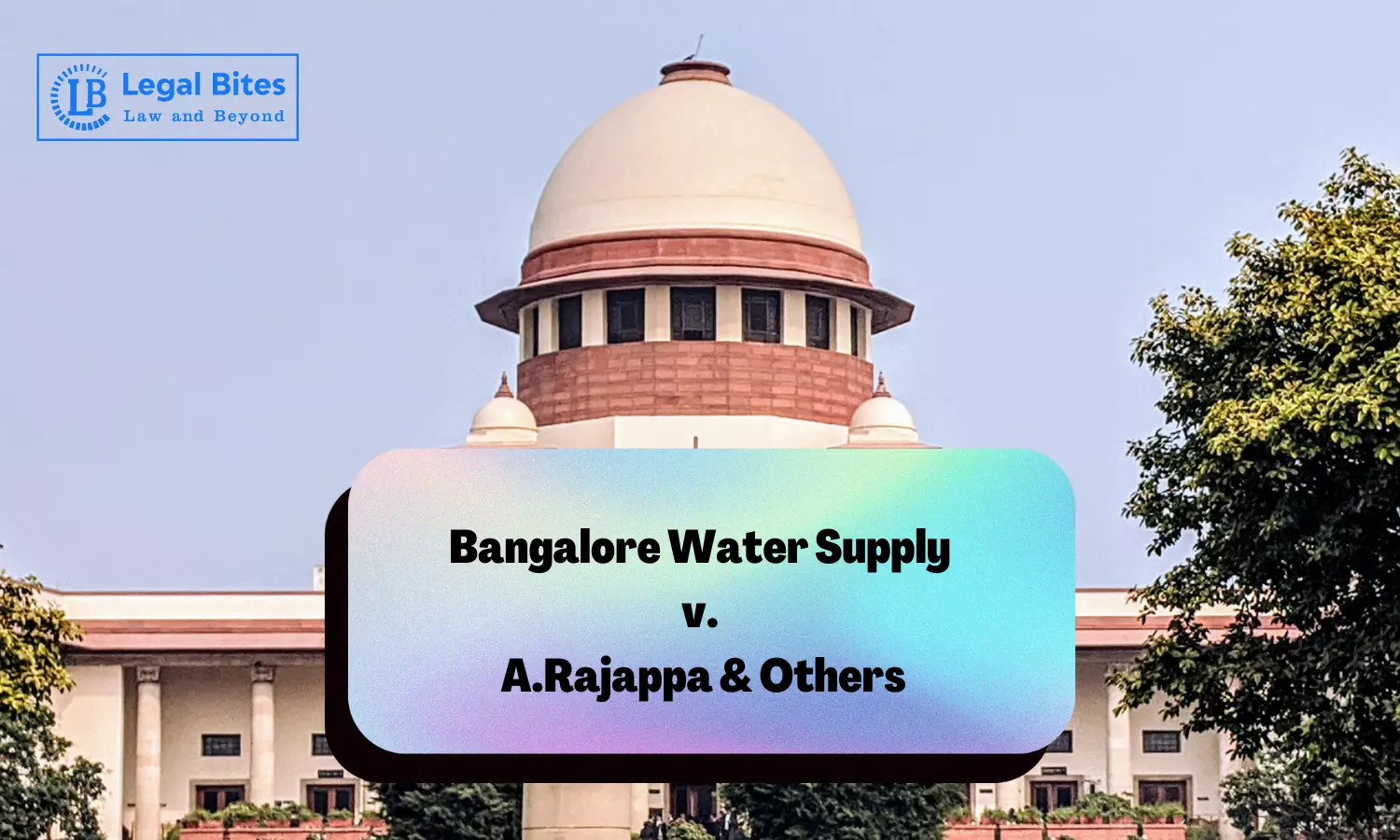Case Analysis: Bangalore Water Supply v. A.Rajappa & Others (1978)
The Case Analysis 'Bangalore Water Supply v. A.Rajappa & Others' by Radhika Mittal is one of the landmark decisions of the Supreme Court of India pertaining to the definition of the term industry.

The Case Analysis 'Bangalore Water Supply v. A.Rajappa & Others' by Radhika Mittal is one of the landmark decisions of the Supreme Court of India pertaining to the definition of the term industry. The Supreme Court has restored judicial discipline and thereby prevented a redundant court-initiated turmoil in the area of labour law by giving a judgment in the Bangalore Water Supply case. The decision is obviously pro-labour as it strives to bring more activities within the fold of...
The Case Analysis 'Bangalore Water Supply v. A.Rajappa & Others' by Radhika Mittal is one of the landmark decisions of the Supreme Court of India pertaining to the definition of the term industry. The Supreme Court has restored judicial discipline and thereby prevented a redundant court-initiated turmoil in the area of labour law by giving a judgment in the Bangalore Water Supply case. The decision is obviously pro-labour as it strives to bring more activities within the fold of the Industrial Dispute Act 1947. The Supreme Court laid down a triple test to examine whether a particular activity was industrial in nature or not.
Title of the Case: Bangalore Water Supply v. A. Rajappa & Others Case Analysis
Appellant: Bangalore Water Supply & Sewerage Board
Respondent: A. Rajappa & Others
Citation: AIR 1978 SC 548
Date of Judgment: 21/02/1978
Decided by: Supreme Court of India
Bench: Beg, M. Hameedullah (Cj), Chandrachud, Y.V., Bhagwati, P.N., Krishnaiyer, V.R. & Tulzapurkar, V.D., Desai, D.A. & Singh, Jaswant.
Facts of the Case
A. Rajappa was an employee of the Bangalore Water Supply and Sewerage Board. A labour dispute was persisting between the employee and the board. A. Rajappa along with several other workmen were fined by the Board for misconduct. A hefty amount was recovered from them which was not reasonable. Therefore, A. Rajappa along with other workmen approached the Labour Court under Section 33C (2) of the Industrial dispute Act, 1947 against the unreasonable and hefty fine levied by the Board for the misconduct of the employees on the ground that the fine is in violation of the principle of natural justice.
The board took the defence that the case is not maintainable because Bangalore Water Supply and Sewerage Board do not qualify as an industry within the definition of Section 2(j) of the Industrial Dispute Act, 1947, and therefore, the Labour Court is not having any jurisdiction to entertain the case. However, the labour court rejected this plea of the Board and held that Bangalore Water Supply and Sewerage Board comes within the definition of industry under Section 2(j) of the Industrial Dispute Act, 1947.
The board then filed two writ petitions before Karnataka High Court at Bangalore under Article 226 of the Constitution of India. The division bench of the Karnataka High Court upheld the decision of the labour court and held that Bangalore Water Supply and Sewerage Board comes within the definition of industry under Section 2(j) of the Industrial Dispute Act, 1947.
The board then preferred an Appeal by Special Leave before the Supreme Court of India under Article 136 of the Constitution of India.
Issues Involved
- Whether Bangalore Water Supply and Sewerage Board fall within the definition of industry under Section 2(j) of the Industrial Dispute Act, 1947?
- What all industries qualify in the definition of Section 2(j) of the Industrial Dispute Act, 1947?
- Whether undertakings governed by no profit- no loss rule, statutory or otherwise fastened, fall within the definition in Section 2(j) of the Industrial Dispute Act, 1947?
Laws Applied
Section 2(j) of Industrial Dispute Act, 1947 – Definition of Industry
Industry means any systematic activity carried on by cooperation between an employer and his workmen (whether such workmen are employed by such employer directly or by or through any agency, including a contractor) for the production, supply or distribution of goods or services with a view to satisfying human wants or wishes (not being wants or wishes which are merely spiritual or religious in nature)" whether or not, --
(i) any capital has been invested for the purpose of carrying on such activity; or
(ii) such activity is carried on with a motive to make any gain or profit and includes--a) any activity of the Dock Labour Board established under section 5A of the Dock Workers (Regulation of Employment) Act, 1948 (9 of 1948);
b) any activity relating to the promotion of sales or business or both carried on by an establishment. but does not include-1. any agricultural operation except where such agricultural operation is carried on in an integrated manner with any other activity (being any such activity as is referred to in the foregoing provisions of this clause) and such other activity is the predominant one. Explanation. -- For the purposes of this sub-clause," agricultural operation" does not include any activity carried on in a plantation as defined in clause (f) of section 2 of the Plantations Labour Act, 1951 (69 of 1951); or
2. hospitals or dispensaries; or
3. educational, scientific, research or training institutions; or
4. institutions owned or managed by organisations wholly or substantially engaged in any charitable, social or philanthropic service; or
5. khadi or village industries; or
6. any activity of the Government relatable to the sovereign functions of the Government including all the activities carried on by the departments of the Central Government dealing with defence research, atomic energy and space; or
7. any domestic service; or
8. any activity, being a profession practised by an individual or body or individuals, if the number of persons employed by the individual or body of individuals in relation to the such profession is less than ten; or
9. any activity, being an activity carried on by a co-operative society or a club or any other like the body of individuals, if the number of persons employed by the co-operative society, club or other like a body of individuals in relation to such activity is less than ten;]
Section 33C (2) of Industrial Dispute Act, 1947- Recovery of Money Due from Employer
Where any workman is entitled to receive from the employer any money or any benefit which is capable of being computed in terms of money and if any question arises as to the amount of money due or as to the amount at which such benefit should be computed, then the question may, subject to any rules that may be made under this Act, be decided by such Labour Court as may be specified in this behalf by the appropriate Government; within a period not exceeding three months:
Provided that where the presiding officer of a Labour Court considers it necessary or expedient so to do, he may, for reasons to be recorded in writing, extend such period by such further period as he may think fit.
Judgment
The Supreme Court of India dismissed the Bangalore Water Supply and Sewerage Board's appeal and held it within the industry definition under Industrial Dispute Act, 1947.
The court held that Section 2(j) of the Industrial Dispute Act,1947, which defines, "industry" contains words of wide import, as wide as the Legislature could have possibly made them. The twin consideration of profit motive and capital investment is irrelevant for determining whether an activity is an industry. In this case, the court laid down two tests to determine whether an establishment or activity qualifies the definition of industry under Section 2(j) of the Industrial Dispute Act,1947. These tests, as laid down by the court, are:
Triple Test
It consists of the following elements-
a) Systematic activity;
b) Cooperation of employers and employees, and
c) Production and/or distribution of goods and services for the satisfaction of material requirements of the people (and not spiritual).
Dominant Nature Test
It consists of the following element:
a) Where a complex of activities, some of which qualify for an exemption, others not,
b) Involves employees on the total undertaking, some of whom are not 'workmen' or some departments are not productive of goods and services if isolated
c) Nature of the services and the integrated nature of the departments will be the true tests.
d) The whole undertaking will be 'industry' although those who are not 'workmen' by definition may not benefit from the status.
e) Even in departments discharging sovereign functions if there are units which are industries and they are substantially severable, then they can be considered to come within Section 2(j).
In order to be termed an industry, an activity must satisfy the triple test and dormant nature test. Profit motive or charitable purpose is irrelevant for the purpose of the triple test. The primary concern of the triple test is the nature of concerned activity and the employer-employee relationship. Further, professional services like medical, educational services, etc., were brought within the meaning of material services and, therefore, were termed as industry within Section 2(j) of the Industrial Dispute Act, 1947. However, the following were not considered as an industry:
- Small clubs, gurukuls, ashrams, schools, and colleges which do not have employee character.
- Single doctor or lawyer because of no organised labour.
- Free legal and medical services.
- Causal activities because they are not systematic
- Sovereign functions like maintenance of law and order, and legislative or judicial functions.
Recent Development
In the present time, the term 'industry' is construed as per the definition given under Section 2(p) of the Industrial Relations Code, 2020. Industrial Relations Code, 2020 has been brought in through an amendment and consolidation of three Central Labour and Industrial Laws on 19th September 2020. These Central Labour laws are:
- Industrial Dispute Act, 1947
- Trade Union Act, 1926
- Industrial Employment (Standing Orders) Act, 1946
The present labour code provides for a broader framework to protect the rights of the workmen, minimise the friction between the employer and the workmen and provide provisions for investigations and settlement of industrial disputes.
2(p) of Industrial Relations Code, 2020
"Industry" means any systematic activity carried on by cooperation between an employer and worker (whether a such worker is employed by the such employer directly or by or through any agency, including a contractor) for the production, supply or distribution of goods or services with a view to satisfying human wants or wishes (not being wants or wishes which are merely spiritual or religious in nature),
whether or not,
- Any capital has been invested for the purpose of carrying on such activity; or
- Such activity is carried on with a motive to make any gain or profit,
But does not include:
- Institutions owned or managed by organisations wholly or substantially engaged in any charitable, social or philanthropic service; or
- Any activity of the appropriate Government relatable to the sovereign functions of the appropriate Government, including all the activities carried on by the departments of the Central Government dealing with defence research, atomic energy and space; or
- Any domestic service; or
- Any other activity as may be notified by the Central Government;
Conclusion
This case is a landmark judgement in the legal history of India. It clarified the definition of industry in the Industry Dispute Act 1947. Therefore, an economic entity is well aware of its role before entering into an employer-workmen relationship. This case gave a wide interpretation to the term 'industry', resulting in a wider horizon of the Labour and Industrial laws in India.
Important Links
Law Library: Notes and Study Material for LLB, LLM, Judiciary and Entrance Exams

Radhika Mittal
Radhika is a freelance content writer, contract drafting specialist and a criminal law enthusiast. Institution: Guru Gobind Singh Indraprastha University Delhi.
